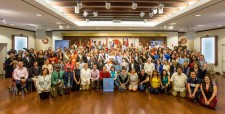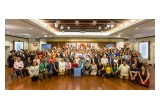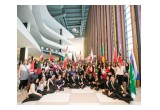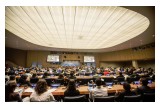Civil Rights Comes to Life at Scientology Harlem Center

New York, NY, August 31, 2016 (Newswire.com) - Harlem, the capital of Black America, provided the fitting conclusion to the 13th annual International Human Rights Summit of Youth for Human Rights International. Held at the Scientology Harlem Community Center, leading young human rights activists learned about the civil rights movement of the 1950s and 60s and its relevance to their work today.
Just as Harlem was a leading voice for civil rights, so are these 72 young men and women representing 41 nations the voice and future of human rights globally.
"Our humanity is in peril. We are being separated—labeled by our religion, race, gender, nationality. Our unity relies on our humanity. It is our duty to teach … the Universal Declaration of Human Rights and practice it."
youth delegate from Saudi Arabia to 13th annual International Human Rights Summit
The Harlem program was the third day of the 13th annual International Human Rights Summit of Youth for Human Rights International that began with two days of presentations and workshops at the United Nations in New York.
At the United Nations Headquarters, the youth attended briefings from UN ambassadors and presentations by youth delegates on the issues they are combating with human rights education.
Youth delegates were selected to represent their nations at the summit based on their outstanding record of human rights activism and their commitment to end such abuses as human trafficking, police brutality, extreme poverty, bullying, gang revenge and war.
“Our humanity is in peril,” said the youth delegate from Saudi Arabia. “We are being separated—labeled by our religion, race, gender, nationality. Our unity relies on our humanity. It is our duty to teach … the Universal Declaration of Human Rights and practice it.”
Award-winning filmmaker Ronald Lang set the tone of the final day of the Summit by describing his new film on human trafficking, produced to protect the lives of victims by raising awareness of the crime. The International Labour Organization estimates that forced labor generates some $150 billion in profits a year and more than 25 million people are trafficked annually including 1.2 million children who are forced into slave labor, sex and organ harvesting. Far from it being a problem only affecting 3rd World nations, Lang stressed that it happens “all over the world, even in my own backyard here in New York and we need to put an end to it.”
The delegates then learned about the success of the civil rights movement and the challenges to human rights in America today.
Mr. Carlyle Holder, immediate past president of the National Association of Blacks in Criminal Justice (NABCJ), briefed the delegates on what he called the “schools to prisons pipeline” plaguing American society—inadequate funding for at-risk youth while the country spends $70 billion to incarcerate its citizens each year. He emphasized the importance of human rights education to raise awareness and take effective action in New York City where there were more than 16,000 robberies, 1,400 rapes and 350 murders in 2015.
The delegates then went out on the street in an activity that ended up being one of the most memorable aspects of the three-day summit because it brought them face-to-face with the state of awareness of human rights today. Based on one of the award-winning Youth for Human Rights International public service announcements, they began on Harlem’s 125th street and walked through Central Park and down to Times Square, approaching people and “reading them their rights”—the 30 rights of the Universal Declaration of Human Rights.
They began by asking “Do you know your human rights?” and most people had no idea what they were. “I know my Miranda Rights” said one young vendor, “but I don’t know my human rights.”
The volunteers then gave them copies of the Youth for Human Rights booklet “What are Human Rights?” that presents these rights in a simple form anyone can understand.
The Church of Scientology and Harlem Community Center were dedicated July 31. Their facilities are configured to serve Scientologists in their ascent to spiritual freedom and serve as a home for the entire community—a meeting ground of cooperative effort to uplift people of all denominations.
Read the article on the Scientology Newsroom.
Source: Scientology Harlem Community Center




